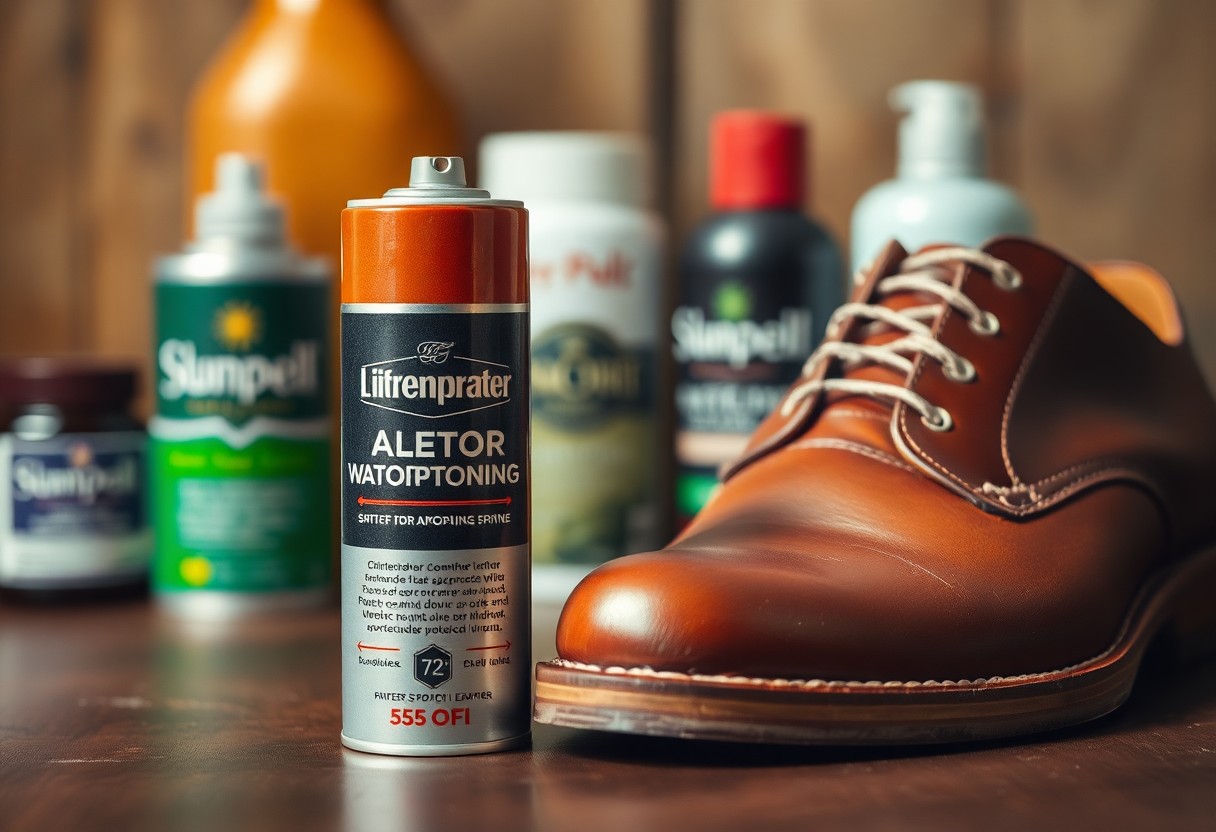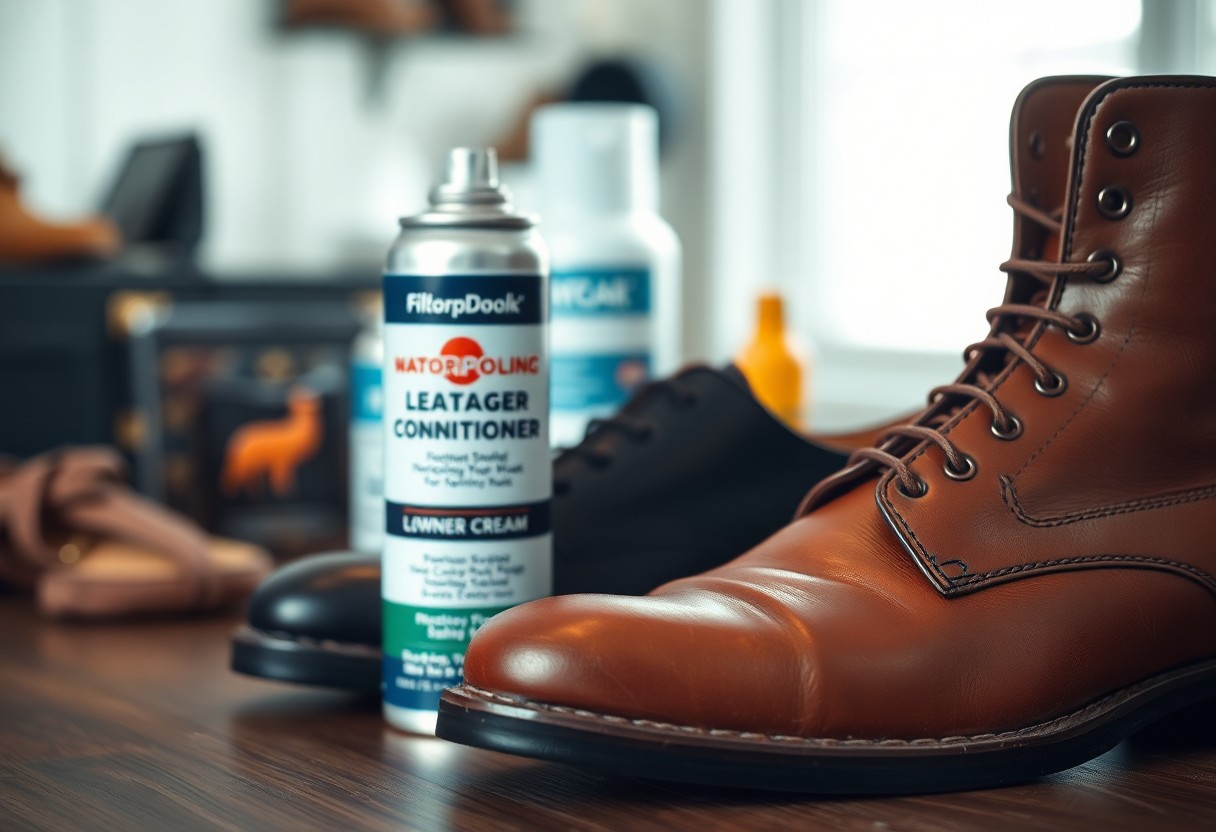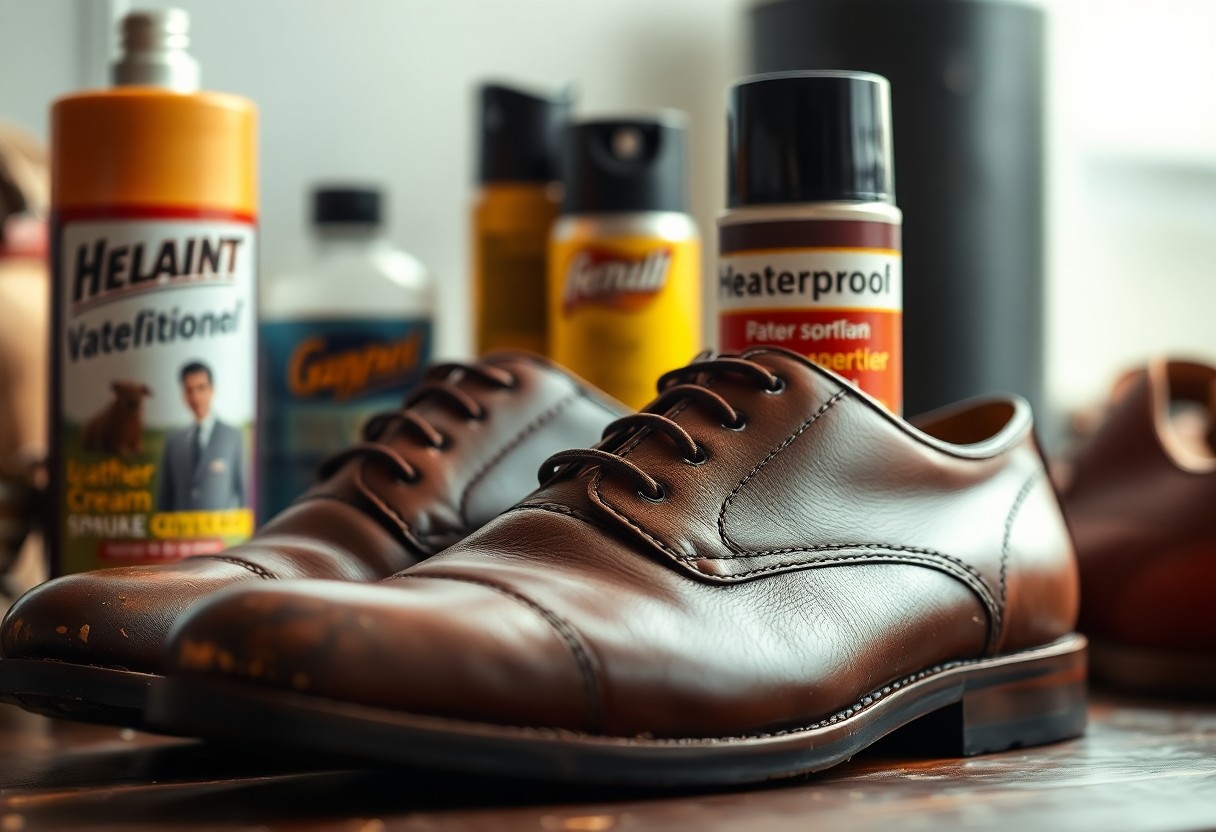Common Leather Care Missteps can lead to irreversible harm to your cherished footwear. One prevalent error is applying waterproofing spray on smooth leather surfaces. While these sprays may seem like a convenient solution to protect your shoes, they can block vital nutrients from penetrating the leather, which can lead to dryness and cracking over time. Smooth leather naturally possesses some water-resistant features inherent in its grain, requiring proper nourishment through shoe creams and waxes to ensure lasting durability. Instead of relying on sprays, opt for high-quality leather conditioners and wax polishes that nourish and protect the leather, thereby enhancing its longevity and preserving its natural attributes.
Enhancing the Lifespan of Leather Through Effective Protection Techniques
Understanding the protective qualities of leather is crucial for extending the longevity of your leather items. Full grain leather is endowed with natural water-resistant characteristics thanks to its tightly woven fiber structure. However, these qualities necessitate regular and attentive maintenance to remain effective. The durability and resilience of your leather goods directly correlate with the level of care they receive. Utilizing waterproofing sprays can restrict the leather’s breathability, potentially causing significant damage over time if not managed correctly. Therefore, it’s important to implement effective care strategies to ensure your leather items endure the test of time.
Discovering the Exceptional Features of Full Grain Leather
After undergoing the tanning process, full grain leather retains its original surface layer, providing unmatched natural protection. Items made from this material keep an unblemished grain layer, which offers resistance against water and wear. This top layer is rich in natural oils and fibers, which create a protective barrier, making additional waterproofing sprays unnecessary and potentially detrimental to the leather’s health. Investing in full grain leather means choosing a product that naturally resists damage while maintaining its beauty and functionality.
Understanding Leather’s Moisture Management and Natural Aging Process
Grain leather must maintain its ability to absorb and release moisture effectively. The pores in your leather allow it to breathe and regulate moisture, keeping it supple and mitigating the risk of unsightly cracks. However, the application of waterproofing sprays can seal these pores, limiting essential airflow and disrupting the natural moisture equilibrium. As leather matures, it demands adequate nourishment through conditioning products. When waterproofing sprays are employed, they create a barrier that prevents essential conditioning oils from penetrating the leather, resulting in dryness and brittleness over time. Regular application of leather cream allows your leather to age gracefully, developing a rich and appealing patina.

Understanding the Risks Associated with Waterproofing Spray
Many individuals mistakenly believe that waterproofing spray is the ultimate remedy for protecting their leather shoes. However, this common practice can lead to severe damage to your footwear. While these sprays provide an immediate layer of protection against water, they simultaneously obstruct vital nutrients from permeating the leather, setting the stage for potential long-term deterioration. It is essential to reconsider this approach and understand the impacts of using such products on your valuable leather items.
Debunking Misconceptions Fueled by Marketing Hype
Due to aggressive marketing strategies and well-meaning advice from shoe store representatives, you might think that waterproofing spray is essential for every type of leather shoe. This misconception has been perpetuated by numerous retailers, often due to the high profit margins and frequent repurchase rates associated with these products. In reality, regular smooth leather possesses natural protective qualities that do not require the addition of spray-on barriers for effective safeguarding. Understanding this can help you make more informed choices regarding leather care.
Evaluating Short-term Benefits Versus Long-term Consequences
The deterioration of your leather shoes begins when waterproofing sprays form a barrier that prevents essential oils and conditioning agents from reaching the leather. Although you may initially observe enhanced water resistance, the truth is that your leather gradually becomes dry and brittle without the necessary nourishment it requires. The implications of using waterproofing sprays on smooth leather extend beyond superficial safety. Your leather needs continuous nourishment to retain its flexibility and durability. When shoe creams and conditioners cannot penetrate the leather due to the spray barrier, the material risks significant damage, shortening the lifespan of your shoes considerably. Utilizing natural waxes and appropriate conditioning offers superior long-term protection while nurturing the leather’s overall health.

Exploring the Science of Effective Leather Care
An essential aspect of successful leather care is comprehending its molecular structure. The collagen fiber networks within your leather shoes require both protection and nourishment. The products you apply can either coat these fibers or penetrate them effectively. This interaction plays a critical role in maintaining the long-term health of your leather footwear. Understanding how to properly care for your leather can make a significant difference in its longevity and performance.
Recognizing the Importance of Regular Leather Nourishment
It’s vital to understand that your leather shoes require consistent nourishment to uphold their quality. The natural oils present in your leather footwear help prevent cracking and maintain flexibility. Over time, these oils diminish due to regular wear and exposure to various environmental elements. To protect the leather’s structural integrity, it’s imperative to replenish these oils through diligent conditioning practices. Regular care will ensure that your shoes remain in optimal condition.
Understanding the Barrier Effects of Waterproofing Sprays
A major drawback of waterproofing sprays is their tendency to form a barrier on leather surfaces. When these sprays are applied to smooth leather, they create an impermeable layer that obstructs both moisture and essential nutrients. This barrier inhibits your leather care products from penetrating effectively, leading to a gradual decline in the leather’s overall quality over time.
The barrier effect of waterproofing sprays creates a problematic cycle for your footwear. While these sprays effectively block water, they simultaneously impede the absorption of conditioning products that are crucial for maintaining the leather’s health. Consequently, your leather may appear protected on the surface while actually becoming dehydrated and brittle beneath. Silicone-based sprays are particularly detrimental, creating a permanent barrier that is challenging to remove without harming the leather.
Adopting Effective Leather Protection Techniques
Contrary to popular belief, your smooth leather shoes require specific care methods that align with the natural properties of full-grain leather. The most effective approach blends traditional methods with products tailored to enhance the leather’s inherent protective qualities, offering both immediate defense and enduring durability for your footwear.
Utilizing the Benefits of Wax-based Solutions
A highly effective alternative to waterproofing sprays is the application of premium wax-based products. These solutions complement your leather’s natural grain instead of working against it. Applying wax polish creates a protective layer that still permits the leather to breathe, making it particularly beneficial for toe caps and regions subjected to heavy wear. This method ensures that your leather remains both protected and healthy.
Improving Leather Quality with Regular Cream and Conditioner Use
In contrast to traditional spray treatments, leather creams and conditioners offer essential nourishment while preserving the leather’s natural protective capabilities. Your footwear benefits from oils that deeply penetrate the material, effectively preventing drying and cracking. Additionally, consistent application of cream and conditioner creates a cumulative effect that enhances the quality of the leather over time. The natural oils found in these products bolster the leather’s flexibility and strength, allowing it to develop a stunning patina. It is advisable to apply these products every 4-6 wears to maintain the optimal condition of your leather.

Determining Appropriate Situations for Waterproofing Spray Usage
In contrast to smooth leather, certain materials greatly benefit from waterproofing sprays. These products create an effective water-resistant barrier on specific materials that lack inherent protection. Waterproofing sprays are particularly advantageous for suede, nubuck, and various textiles, where the material structure does not provide natural moisture resistance.
Enhancing Suede and Nubuck with Effective Waterproofing Spray
By treating your suede or nubuck footwear with waterproofing spray, you significantly bolster their resistance to moisture damage. Although many contemporary suede materials come pre-treated with factory waterproofing, additional protection can help sustain this defense over time. The application of spray establishes a protective barrier that effectively prevents water from penetrating these delicate materials, thus extending their lifespan.
Providing Optimal Protection for Textile Footwear
In addition to leather alternatives, textile footwear requires specialized protection against water damage. Materials like canvas, mesh, and synthetic fabrics can achieve improved water resistance through proper spray application. Most textile materials are inherently absorbent, making them vulnerable to water damage and staining.
Moreover, waterproofing sprays designed for textiles help preserve the shape and color of your shoes. The barrier they create also prevents dirt and debris from becoming embedded in the fabric fibers. It is advisable to reapply the spray every 3-4 months for optimal protection, depending on how frequently the shoes are used and the prevailing weather conditions.
Expert Insights and Recommendations for Leather Care
Not all leather treatments yield the same results. Leather care experts strongly advise against using waterproofing sprays on smooth leather. Your full-grain leather shoes require specialized care that facilitates breathing and absorption of nourishing treatments. Using inappropriate products can lead to leather damage that could incur significant repair costs.
Guidance from Tannery Professionals
To maintain the quality of leather, tannery specialists emphasize that full-grain leather naturally contains water-resistant properties in its outer layer. Preserving the leather’s protective qualities necessitates the application of oils and waxes. Waterproofing sprays can obstruct these essential treatments from penetrating the leather, leading to long-term degradation.
Insights from Professional Cobblers on Leather Durability
For the sustainable care of leather, professional cobblers recommend the use of wax-based products as an alternative to waterproofing sprays. Your shoes will flourish with treatments that both protect and nourish the leather. Research indicates that 90% of premature leather damage arises from the use of incorrect care products. By adhering to proper leather care techniques, your footwear can last an astounding 15-20 years as opposed to just 2-3 years with insufficient maintenance. Traditional wax treatments allow leather to retain its natural characteristics while providing adequate moisture protection. Your investment in high-quality leather footwear deserves diligent care practices that maintain both its visual appeal and durability.
Key Takeaways for Effective Leather Care Strategies
In conclusion, your smooth leather shoes require appropriate care that avoids waterproofing sprays. Instead, select shoe creams and waxes that nourish the leather while delivering effective water protection. Full-grain leather inherently possesses natural protective qualities due to its grain layer, and waterproofing sprays may inhibit essential oils from penetrating the leather, resulting in dryness and cracking. Reserve waterproofing sprays for suede, nubuck, or textile footwear where they can be most beneficial. By opting for the right products, you can effectively safeguard your leather shoes while ensuring their longevity and continued performance.
Answers to Your Leather Care Queries
Q: Why does waterproofing spray pose a risk to smooth leather shoes?
A: Waterproofing spray forms a barrier on leather that obstructs essential oils and conditioning agents from penetrating the material. While it provides a level of water protection, it simultaneously hinders the necessary nourishment of the leather, leading to dryness and potential cracking over time, ultimately reducing the shoes’ lifespan.
Q: What alternatives are recommended instead of waterproofing spray for smooth leather shoes?
A: Consider utilizing a combination of shoe cream and wax polish. Shoe cream delivers essential oils to nourish the leather, while wax polish forms a protective layer that assists in repelling water. This method aligns with the natural protective properties of full-grain leather, preserving the quality of the leather while providing effective water resistance.
Q: Which types of footwear can I safely apply waterproofing spray to?
A: Waterproofing spray is suitable for materials such as suede, nubuck, and textiles. These materials lack the natural protection found in smooth leather and therefore benefit from the barrier created by waterproofing sprays. Many modern suedes and nubucks may already have factory waterproofing treatments, but additional applications can further enhance and sustain this level of protection.
The Article Why you shouldn’t use waterproofing spray on regular smooth leather and better alternatives appeared first on My Shoes Finder
The Article Waterproofing Spray on Smooth Leather: Risks and Alternatives Was Found On https://limitsofstrategy.com
The Article Waterproofing Spray Risks and Alternatives for Smooth Leather First Appeared ON
: https://ad4sc.com
Comments are closed